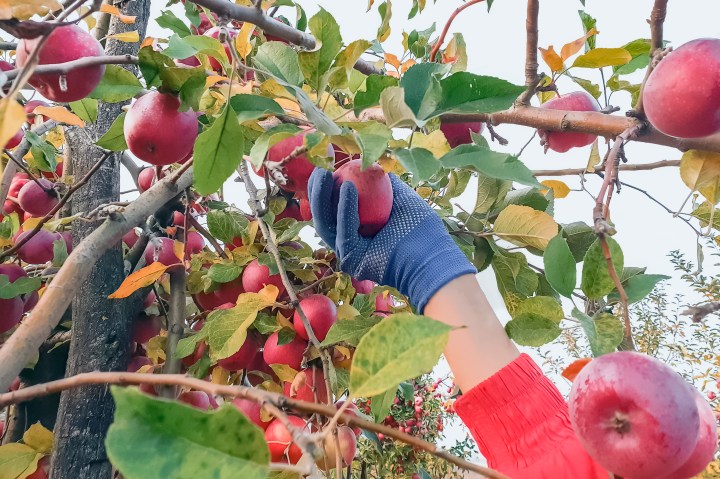
Apple season waits for no pandemic on a Washington farm
Apple season waits for no pandemic on a Washington farm

As summer winds down, the apple harvest is getting into gear. Harvesting and selling apples amid a pandemic and a recession brings a new set of challenges for farmers. “Marketplace” host Kai Ryssdal spoke to Patrick Smith of Loftus Ranches, a family-run farm producing apples and hops in Yakima, Washington, about those challenges. Below is an edited transcript of their conversation.
Kai Ryssdal: What’s it like harvesting apples in the time of coronavirus, man?
Patrick Smith: Yeah, it’s interesting. Every year throws a new challenge at us. And this is certainly different than anything we have experienced in the past — a lot of new precautions that we have to take and things that we’re doing to keep our people safe and healthy while still getting the crop off in a timely fashion.
Ryssdal: Well, one of the things I remember from being up there — which is too many years ago now, I think, and when we can travel again, I’ll come back — but this is a whole conversation that I had with you and your dad, the real structure and attention you put into your seasonal labor. How is that going? I mean, can you get people to get the fruit off the trees?
Smith: Yeah, I mean, first and foremost, you’re welcome to come back anytime, but yeah, as far as our seasonal labor force, a significant proportion of the laborers here in Central Washington that harvest apples and hops and everything else are H-2A workers, predominantly from Mexico. But with, you know, some of the precautions that are being taken at the border, the consulates are restricting visitors and appointments. And so getting those individuals, their visas, has been slower. And in some cases, it’s not happening. So that is affecting the supply of labor. But we’re hanging in there. We’re a little bit short, but we should have enough to do what we need to do.
Ryssdal: And then what about pricing? Because the last couple of times we have talked to you, you’ve been a bit pricing-challenged, right, with some of the trade issues and excess fruit and all that. Is it stabilizing? Are you able to get what you need for your fruit now?
Smith: Yeah, I’d say that it’s stabilizing. There are some indications that maybe the first of this 2020 harvest, the prices are up a little bit, which would certainly be helpful, but it’s still very early to tell. I mean, we’ve only been really harvesting apples here for, you know, 10 days or so. Export volumes have started to come back, but we’re probably only halfway back from what we had lost from, you know, 2017 and 2018. Inventory levels in the industry are at record highs right now, so that is presenting a little bit of a challenge. You know, fingers crossed that the export trends continue and that we get some better pricing and better movement.
Ryssdal: Last thing and then I’ll get out of your hair: What — and it’s a little personal, so you can tell me go pound sand if you want to — but how’s the Smith household getting by in times of coronavirus? I mean, you’re out in a rural part of the country. What’s it like for you guys?
Smith: Yeah, it’s tough. I mean, we’ve got three young kids, and doing school online is a bit of a challenge. And then my wife operates a preschool here, and so she’s been shut down since March, and so that’s certainly affecting all of us. We’re dealing with a lot of the, you know, same challenges on that front as families across the country are, and so, you know, I think we’re all looking forward to getting the kids back in the classroom when it’s safe and appropriate to do so.
There’s a lot happening in the world. Through it all, Marketplace is here for you.
You rely on Marketplace to break down the world’s events and tell you how it affects you in a fact-based, approachable way. We rely on your financial support to keep making that possible.
Your donation today powers the independent journalism that you rely on. For just $5/month, you can help sustain Marketplace so we can keep reporting on the things that matter to you.


















